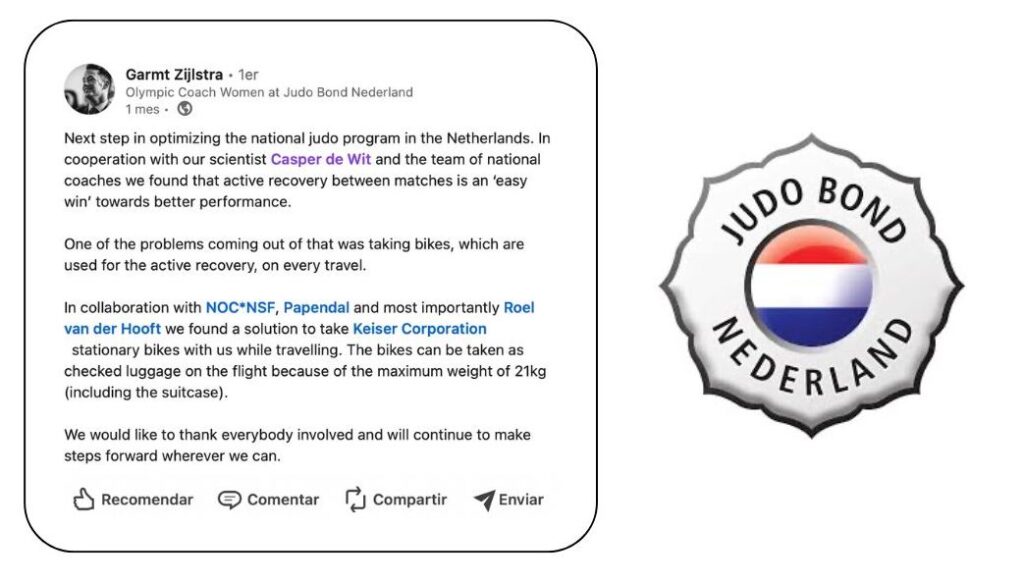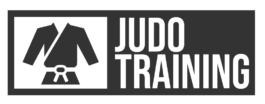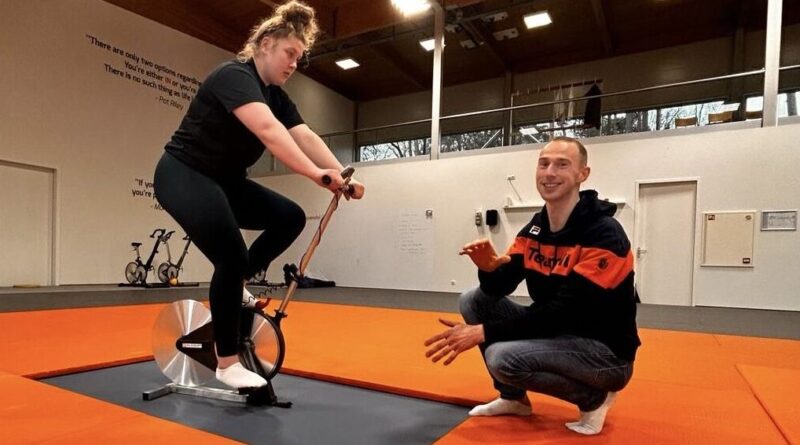Active recovery between matches?
Few weeks ago Garmt Zijlstra announced on his social media (Linkedin) that Netherlands judo team found that active recovery between matches is an ‘easy win’ towards better performance. Also they explained how they solved the problem to take bikes on every travel. Is great to see how professional judo teams try to improve their performance using sports science knowledge.


Several studies have investigated the effect of the mode of recovery (active vs. passive) on the performance in judo. The results obtained are controversial and more research is needed.

- Franchini et al. (2003) found that lactate removal was improved with active recovery when compared to passive recovery but active recovery did not improve performance in a subsequent intermittent anaerobic exercise.
- Franchini et at. (2009) compared active recovery and passive recovery after a judo match and concluded that the odds ratio of winning a match increased ten times when a judoka performed active recovery and his opponent performed passive recovery, but the cause of this phenomenon cannot be explained by changes in number of actions performed or by changes in match’s time structure.
- Touguinha et al. (2011) concluded that after 9 min of recovery, no differences were found when comparing passive recovery and active recovery to reduce hyperlactacidemia. However, both recovery protocols (PR and AR) led to decreased levels of blood lactate concentration when compared with the post-task moment.
- Naghibi (2012) studied the effect of active and passive recovery after Wingate test, showing their results that active recovery causes better maximum anaerobic power in judo athletes.
- Chtourou et al. (2013) concluded that active recovery could not be used between judo matches since the judokas need some minutes for muscles relaxation and to concentrate prior to the upcoming combat since judo requires tactical excellence.
- The results of the study carried out by Trajkovic et at. (2017) revealed that levels of lactic acid following a specific judo effort were significantly lower when athletes use active recovery versus sodium bicarbonate intake.
- The narrative review about post exercise recovery in combat sports carried out by Lópel-Laval et al. (2021) concluded that in relationship with recovery during competition, more research is needed.
REFERENCES
Franchini, Emerson & Takito, Monica & Nakamura, Fabio & Matsushigue, Karin & Kiss, Maria. (2004). Effects of recovery type after a judo combat on blood lactate removal and on performance in an intermittent anaerobic task. The Journal of sports medicine and physical fitness. 43. 424-31.
Franchini E, de Moraes Bertuzzi RC, Takito MY, Kiss MA. Effects of recovery type after a judo match on blood lactate and performance in specific and non-specific judo tasks. Eur J Appl Physiol. 2009 Nov;107(4):377-83.
Touguinha, Henrique & Silva, F.F. & Carvalho, Wellington Roberto & Freitas, W.Z. & Silva, E. & Souza, Renato. (2011). Effects of active vs. passive recovery on blood lactate after specific judo-task. Journal of Exercise Physiology Online. 14. 54-61.
Seyedhadi Naghibi (2012). Effect of active and passive recovery after Wingate Test in athletes. Annals of Biological Research, 3 (5):2517-2519.
Chtourou, Hamdi & Baklouti, Hana & Aloui, Asma & Najla, Ismaïl & Masmoudi, Liwa & Karim, Chamari & Chaouachi, Anis & Souissi, Nizar. (2013). Effects of recovery type on judokas’ short-term maximal performances during a simulated competition. British journal of sports medicine. 47. e3. 10.1136/bjsports-2013-092558.16.
Trajković, Nebojša & Šančić, Josip & Scruton, Adrian & Prosoli, Rebeka & Štefan, Lovro & Sporis, Goran & Madić, Dejan. (2017). Active recovery vs sodium bicarbonate: Impact on lactic acid removal following a specific judo effort. Archives of Budo. 13.
López, Isaac & Mielgo-Ayuso, Juan & Terrados, Nicolás & Calleja Gonzalez, Julio. (2020). Evidence-based post exercise recovery in combat sports: A narrative review. The Journal of sports medicine. 61.

